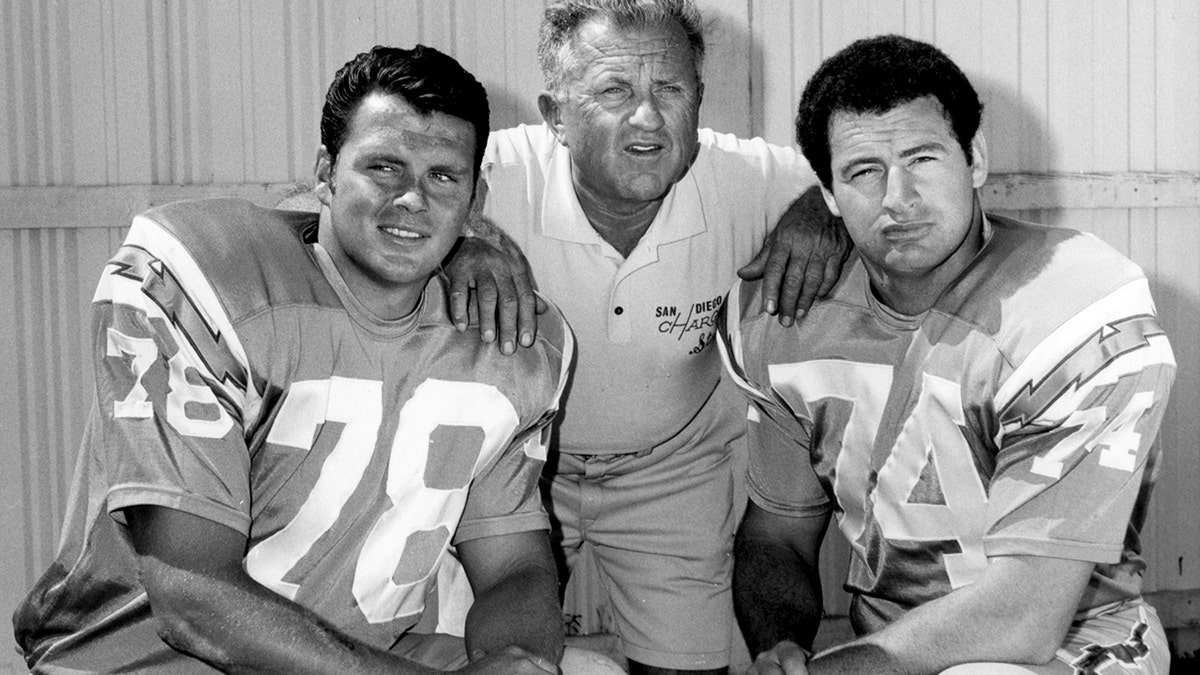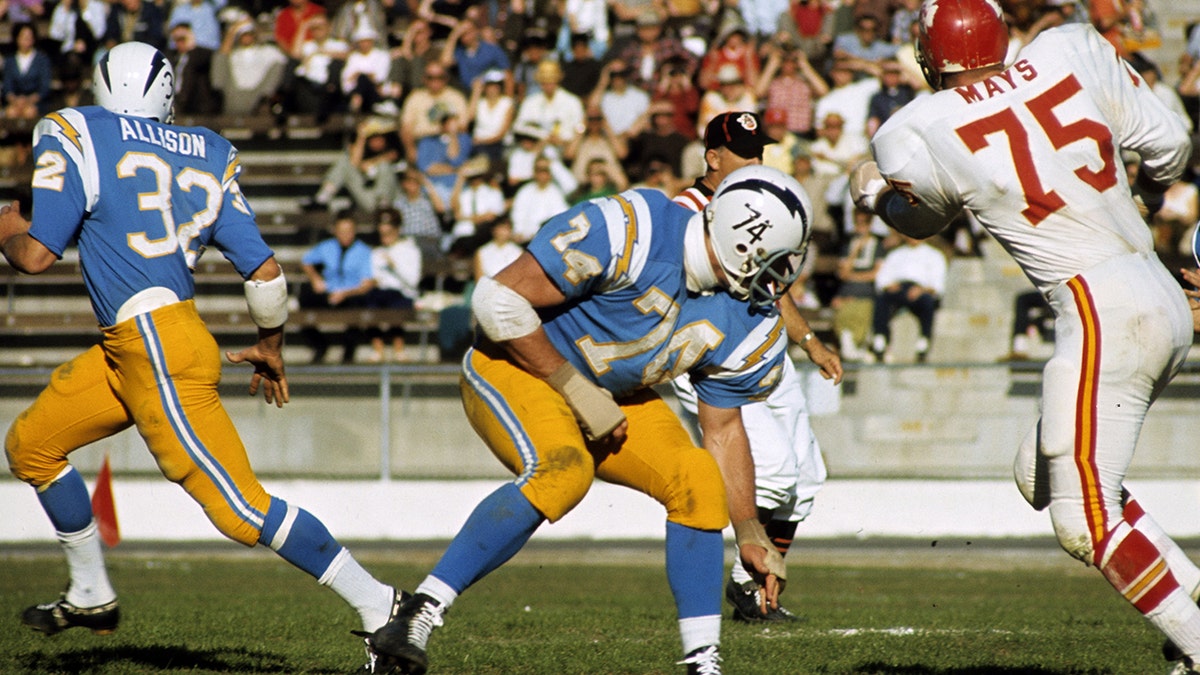Fox News Flash top headlines for April 26
Fox News Flash top headlines are here. Check out what's clicking on Foxnews.com.
LAS VEGAS – Pro Football Hall of Famer Ron Mix had an important decision to make in 1960 – a decision no player entering this week’s NFL Draft will ever have to face.
Should he play in the National Football League or the upstart rival American Football League?
Mix was the No. 10 overall selection in the NFL Draft by the Baltimore Colts and the No. 1 overall pick AFL Draft by the Boston Patriots in 1960 after a stellar career as an offensive lineman at USC. Looking back at his experience in the draft process, Mix explained to Fox News Digital just how different it was.
CLICK HERE FOR MORE SPORTS COVERAGE ON FOXNEWS.COM

New Orleans Saints offensive lineman Walt Sweeney, left, and Ron Mix with offensive line coach Joe Madro, circa 1967. (Charles Aqua Viva/Getty Images)
"First of all, it’s unlike today. Back then, there was very little publicity leading up to the draft. I mean, very little. I had zero contact with the Colts prior to them drafting me. I actually saw news of the draft in the newspaper before I even spoke to the Colts," he said.
"Back then with the newly formed American Football League, it was the Boston team that drafted me and I told the Boston team that if I had to go back east, I was definitely going to sign with the Colts. The teams were cooperating with each other. The AFL teams were more interested in getting the best players that existed from the college draft with any team. They just wanted to field good teams. So, they traded me to the Chargers and that’s who I dealt with."
Mix said the Colts offered him a one-year non-guaranteed contract worth about $7,500 with a $1,000 signing bonus while the Chargers offered a two-year guaranteed contract, $12,000 annually with a $5,000 signing bonus.
"I told (then-Colts owner) Carroll Rosenbloom I rather play for the Colts. I told them what the Chargers’ offer was. I said if you give me a one-year contract at $10,000 and a $2,000 signing bonus, then I’ll sign with the Colts. He said, ‘Ron, that’s almost as much we pay our quarterback Johnny Unitas.’ He said that would throw off our salary structure so much we just can’t do it. He was telling the truth."
Mix said Rosenbloom told him the American Football League was going to fold anyway and said he would see Mix "next year."
"Naturally, I signed with the Chargers. But that’s the way things were back then. I mean, it was life-changing for me."
Mix agreed that playing for the Chargers in his hometown of Los Angeles was the added sweetener for him.

Offensive tackle Ron Mix of the Chargers blocks Chiefs defensive lineman Jerry Mays in a 27-17 loss to Kansas City on Dec. 18, 1966, in San Diego, California. (James Flores/Getty Images)
"That’s true because for one thing, I hadn’t graduated. I was drafted before graduating. Before I finished my senior year, I still needed another semester. It was very attractive to play for the Chargers," he told Fox News Digital.
"What was really special about it, and this is kinda lost in history, but what was special about it was that the NFL as a group had the same attitude as Carroll Rosenbloom – and that was the movie was gonna fail. So, they did not compete for players. The AFL, I would say over the first four years, probably signed 80% of the top college players and were distributing them among eight teams while the NFL, I think they just had 10 teams back then, was distributing among their teams. But we had all the best young talent there was."
Mix would play pro football from 1960 to 1969 and then one more season in 1970 for the Oakland Raiders. He was an eight-time AFL All-Star and a nine-time All-AFL team member. He helped the Chargers win an AFL Championship in 1963.
Among the advice Mix had for rookies coming into the draft, one was to get a good agent.
"Anybody that has the prospect of being drafted or being picked up as a free agent, should have an agent. Should be one with a good reputation. An agent that does as much for you pre-draft as possible and post-draft as possible," Mix said, adding that prospects should take advantage of all they have to offer.
NFL DRAFT 2022: THESE 4 TEAMS HAVE TO STRIKE IT BIG, ANALYST SAYS
Mix said a prospect should be able to see whether they will get access to the playbook early and start studying as much as they could.
"Really just get ready when you’re drafted, see how quickly they’ll give you the playbook so you can learn your plays. You don't want to mess up in camp, mess up plays because of indecision. You don't quite know what to do so you’re a second or even a nanosecond behind," Mix told Fox News Digital. "When you participate in these voluntary team workouts, you just got to do it. You’ve got to be noticed. In training camp, you’re not there to make friends. Don’t try to be one of the boys and go out for drinks. Give attention to what you’re doing. Take it up a notch and go above what’s expected. You’ve got to be noticed. If they say this drill is half-speed, you go three-quarters speed. Don’t worry about whether somebody’s angry with you. Don’t worry about if it leads to a fight. You’re fighting for a job for you and your family."

San Diego Chargers Hall of Fame tackle Ron Mix huddles over injured halfback Keith Lincoln during the AFL Championship Game, a 20-7 loss to the Bills on Dec. 26, 1964, at War Memorial Stadium in Buffalo, New York. (Fred Roe/Getty Images)
Aside from all the accolades the now 84-year-old offensive lineman received as a player, he was also a champion for social justice before any of that was a talking point
Mix was the first White player in 1965 to put pressure on the AFL to move the All-Star Game out of New Orleans in a civil rights boycott. Black players said they wouldn’t play in the city over the denial of basic rights. Mix’s decision to step forward was followed by other White players and the game was moved to Houston. He wrote about the decision in a piece for Trojan Wire in 2020.
CLICK HERE TO GET THE FOX NEWS APP
Currently, Mix serves as the president of the Pro Football Retired Players Association Board of Directors.
According to the organization’s website, the PFRPA is "focused on bettering the lives of those who gave so much to the game. After hanging up their cleats, life after football varies for every player. We strongly believe that each player, no matter what their position or how long they played, should receive some level of support. We're passionate about our members, and that's what drives us to tackle issues that matter to them."










































